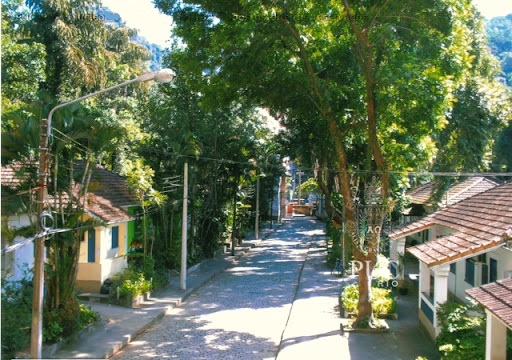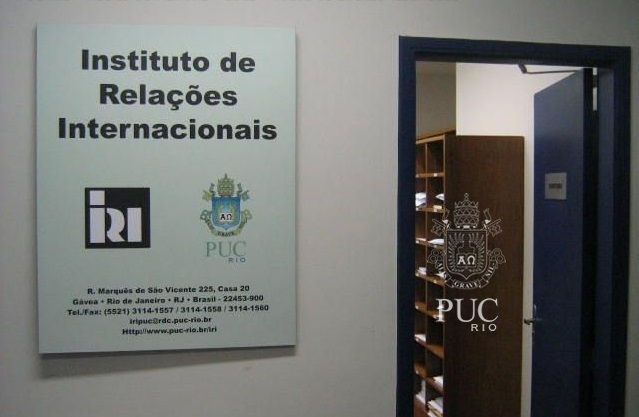History

The Institute of International Relations (IRI/PUC-Rio), created in 1979 as a Complementary Unit of the Social Sciences Center at PUC-Rio, was characterized since its inception by a strong emphasis on graduate-level teaching and research. The Institute was, along with IRel/UnB, a pioneer in the creation and promotion of research in the area of International Relations (IR).
Inaugurated as a center of reflection on international relations, between 1983 and 1986, IRI incorporated teaching activities within the “Law and International Relations” line of research at PUC-Rio’s Master’s Degree in Legal Sciences.
In this same period, the launch of the Contexto Internacional journal, whose first issue was published in 1985, caused an expansion of research activities and its dissemination. Contexto Internacional has now established itself as a reference in the area and as an key factor for the Institute’s visibility and internationalization.
Given the need to train professionals in the area of International Relations, the lack of Brazilian research in the discipline, and the expansion of debates on the field of research at regional and global levels, IRI inaugurated in 1987 its Masters Program in International. The continuing development of teaching and research activities in the context of graduate studies led, in 2001, to the implementation of a pioneering PhD program in International Relations in Brazil. Having completed more than a quarter of a century of operation, the Graduate Program at IRI now has a leading role in teaching and research within the field in Brazil.
After more than decade of activity, the doctoral program at IRI is already consolidated as one of the main national references for the training of high-level professionals to work in undergraduate and graduate programs in International Relations in Brazil and abroad. Many graduates from IRI have been incorporated into teaching, research and extension activities in several public and private universities in Rio de Janeiro and throughout the country, thus contributing to the growth and consolidation of the discipline nationally. Alongside the consolidation of the Graduate Program, the consolidation and growing reach of the Undergraduate Program in International Relations, created in 2003, is also noteworthy.
In 2013, IRI’s Undergraduate Program in International Relations completed 10 (ten) years of activities, a trajectory that has consolidated it as one of the most important courses in the country. IRI’s undergraduate course has achieved the best ENADE scores among courses in Rio de Janeiro and was classified by the Guia do Estudante 2016 with 5 (five) stars.

Since the last triennium, and particularly after the Undergraduate Program’s pedagogical project’s reform in 2009, IRI has made efforts to provide greater consistency to the links between its teaching and research programs. The implementation since 2008 of the lato sensu postgraduate specialization course, intitled Contemporary International Relations – Actors and Processes, is also worth mentioning.
The experience gained with specialization program provided the conditions for the establishment of a Professional Master’s Program at IRI in 2016. The Professional Master in International Policy Analysis and Management: Conflict Resolution and Cooperation for Development (MAPI) is a stricto sensu Graduate Program created to train its students for professional practice in the area of International Relations.
The Professional Master’s Program (MAPI) incorporates theoretical and conceptual foundations with the development of specific skills for professional practice in its curriculum. In addition to faculty integration, the processes of direct transfer from the Undergraduate course to the Master’s Program and from Master’s Program to the PhD Program has contributed greatly to integrating the Institute’s undergraduate and graduate teaching and research in International Relations. It’s expected that the Professional Master’s will complete this cycle of integration by offering an alternative, with the same level of excellence as our Academic Master’s Program, to those undergraduate students who wish to engage with professional courses in MAPI’s two areas of concentration: “International Cooperation for Development” and “International Conflict Resolution”.
In addition to the creation of MAPI, another initiative that highlights IRI’s growing efforts to bridge the gap between knowledge production and policymaking concerns the creation of the BRICS Policy Center (BPC) in 2010. Managed by PUC-Rio’s Institute of International Relations (IRI) in partnership with Rio de Janeiro’s City Hall, the BPC is dedicated to research on the countries that make up the BRICS (Brazil, India, China, and South Africa) and other middle powers. International conflict mediation, international cooperation for development, studies on cities, and socio-environmental issues are some of the themes developed at the Center, fully integrated with IRI’s lines of research.
The BPC promotes cooperation and the exchange of information between research institutions in BRICS countries. The Center disseminates its research through academic articles, policy briefs, monitors, books, and indicators, all available on its website. The BPC once again stood out, in 2016, among the best Think Tanks in the world, according to the annual report prepared by the University of Pennsylvania in the United States. The Global Go To Think Tank Report 2016 recognized the important global contributions and trends perpetrated by Think Tanks. Of the 89 Think Tanks that appear in the report, BPC has the best positions in categories such as “Top Think Tank for Science and Technology”, “Best Idea or Paradigm Developed by a Think Tank”, “Best Transdisciplinary Research Program”, “Best Use of Social Media and Networks” and, finally, as the only Brazilian representative in the category “Best Think Tanks Affiliated to Universities”.
In 2013, the Global South Unit for Mediation” (GSUM) was launched as a knowledge, research and training platform which aims to promote the dissemination of knowledge and skills in international mediation among academics, diplomats, government officials and non-governmental actors from the Global South. The project is a partnership between IRI, the BPC, and the Royal Norwegian Embassy in Brazil. Its mission is to produce knowledge about different aspects of international mediation, with emphasis on experiences and contributions from the Global South. The experiences of the BPC and GSUM have been contributing to (i) the internationalization and visibility of the Institute, (ii) the academic interaction among undergraduate and graduate students and faculty, (iii) the strengthening of the scientific and technical production of the Institute, (iv) the amalgamation of the production of scientific knowledge with the development of professional skills and competences, and also, (v) to pluralize and decentralize the production of knowledge and dominant practices from the experience and contributions of the Global South.
The approval, in 2015, of the inter-institutional doctoral program (DINTER) between IRI/PUC-Rio and UNILA (Federal University of Latin American Integration), aimed at training PhDs in the concentration area of International Politics with an emphasis on regional integration processes, particularly in the Latin American region, stands out in the scope of IRI’s solidarity policies.
In conclusion, IRI has a plural, highly qualified, updated and internationalized faculty that transits through the Institute’s different programs with a prolific national and international scientific production within the upper strata of the field of Political Science/International Relations. In addition to the debate spaces created by the Program where the Graduate students interact with each other and with the faculty, they also support IRI’s many initiatives, getting involved in the co-tutorship of the scientific initiation activities and acting as Teaching Assistants, participating in faculty members’ research projects financed by Brazilian research fomentation agencies like CNPq, FAPERJ and CAPES, getting involved in research activities at the BPC and GSUM, and producing articles in co-authorship with faculty.